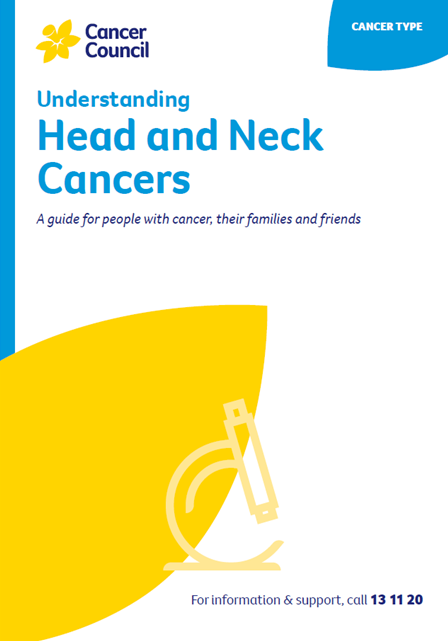- Home
- Head and neck cancers
- Treatment
Head and neck cancer treatment
Head and neck cancers may be treated in different ways, depending on the type, location and stage of the cancer, your general health and what is important to you.
Learn more about:
- Overview
- Making treatment decisions
- Preparing for treatment
- Surgery
- Radiation therapy
- Chemotherapy
- Other drug therapies
- Palliative treatment
Overview
The key treatments for head and neck cancers are:
| surgery | removes cancer or repairs a part of the body affected by cancer; sometimes used as the main treatment |
| radiation therapy | the use of targeted radiation to kill or damage cancer cells; sometimes used as the main treatment |
| chemotherapy | the use of drugs that kill cancer cells or slow their growth; usually combined with radiation therapy, which is known as chemoradiation |
| immunotherapy | the use of drugs that use the body’s own immune system to fight cancer |
| targeted therapy | the use of drugs that target specific features of cancer cells to stop the cancer from growing and spreading |
You may have one or more treatments. You may be able to have new treatments through clinical trials. Treatment will be tailored to your situation. For complex cancers, treatment options should be discussed at a multidisciplinary team meeting (MDT) in a specialised head and neck cancer centre.
There can be extra costs during cancer treatment, even if you have private health insurance or are a public patient. Health care providers must tell you how much you’ll pay for tests, treatments, medicines and hospital care. This is called informed financial consent. Call Cancer Council on 13 11 20 and ask for more information about informed financial consent.
→ READ MORE: Making treatment decisions
Podcast: Making Treatment Decisions
Listen to more of our podcast for people affected by cancer
More resources
A/Prof Martin Batstone, Oral and Maxillofacial Surgeon and Director of the Maxillofacial Unit, Royal Brisbane and Women’s Hospital, QLD; Polly Baldwin, 13 11 20 Consultant, Cancer Council SA; Martin Boyle, Consumer; Dr Teresa Brown, Assistant Director Dietetics, Royal Brisbane and Women’s Hospital, Honorary Associate Professor, University of Queensland, QLD; Dr Hayley Dixon, Head, Clinical Support Dentistry Department, WSLHD Oral Health Services, Public Health Dentistry Specialist, NSW; Head and Neck Cancer Care Nursing Team, Royal Melbourne Hospital, VIC; Rhys Hughes, Senior Speech Pathologist, Peter MacCallum Cancer Centre, VIC; Dr Annette Lim, Medical Oncologist and Clinician Researcher – Head and Neck and Non-melanoma Skin Cancer, Peter MacCallum Cancer Centre, VIC; Dr Sweet Ping Ng, Radiation Oncologist, Austin Health, VIC; Deb Pickersgill, Senior Clinical Exercise Physiologist, Queensland Sports Medicine Centre, QLD; John Spurr, Consumer; Kate Woodhead, Physiotherapist, St Vincent’s Health, Melbourne, VIC; A/Prof Sue-Ching Yeoh, Oral Medicine Specialist, University of Sydney, Sydney Oral Medicine, Royal Prince Alfred Hospital, Chris O’Brien Lifehouse, NSW.
View the Cancer Council NSW editorial policy.
View all publications or call 13 11 20 for free printed copies.

